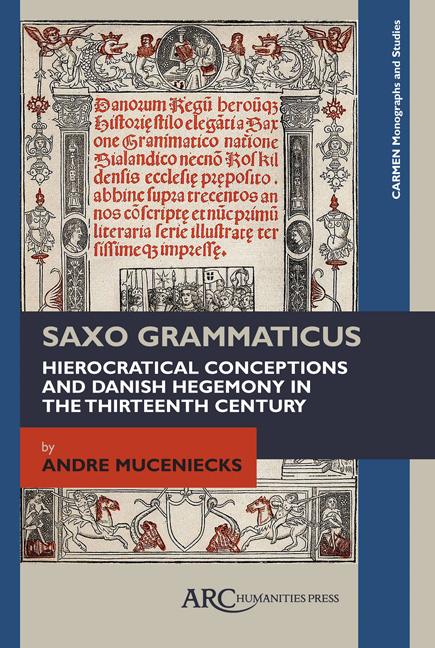Book contents
- Frontmatter
- Contents
- List of Illustrations
- Acknowledgements
- Foreword
- Preface
- Chapter 1 Denmark and the Baltic in the Thirteenth Century
- Chapter 2 The Work
- Chapter 3 Political Conceptions
- Chapter 4 Euhemerism and the East in Saxo Grammaticus
- Chapter 5 Virtues and Values in Saxo Grammaticus: The Four Cardinal Virtues
- Chapter 6 The Thematic of the Counsellor
- Conclusion
- Appendix 1 List of the Kings in Books I–VIII of the Gesta Danorum
- Appendix 2 Rulers and Archbishops of Denmark in Relation to Events in the Baltic, the Empire, and the Papacy
- Appendix 3 Genealogy of the Valdemarian Kings
- Bibliography
- Index of Persons
- Index of Places and Peoples
- Index of Authors and Primary Sources
- Index of Subjects
Chapter 2 - The Work
Published online by Cambridge University Press: 15 January 2021
- Frontmatter
- Contents
- List of Illustrations
- Acknowledgements
- Foreword
- Preface
- Chapter 1 Denmark and the Baltic in the Thirteenth Century
- Chapter 2 The Work
- Chapter 3 Political Conceptions
- Chapter 4 Euhemerism and the East in Saxo Grammaticus
- Chapter 5 Virtues and Values in Saxo Grammaticus: The Four Cardinal Virtues
- Chapter 6 The Thematic of the Counsellor
- Conclusion
- Appendix 1 List of the Kings in Books I–VIII of the Gesta Danorum
- Appendix 2 Rulers and Archbishops of Denmark in Relation to Events in the Baltic, the Empire, and the Papacy
- Appendix 3 Genealogy of the Valdemarian Kings
- Bibliography
- Index of Persons
- Index of Places and Peoples
- Index of Authors and Primary Sources
- Index of Subjects
Summary
Scholarship in Scandinavia in the Twelfth and Thirteenth Centuries
THE PERIOD BETWEEN 1170 and 1230 is one of marked increase in the writing both in continental Scandinavia and on Iceland. The concomitant strengthening of the relations with other European nations and regions as the British Isles and the Continent provided new literary models and the influence of Christianity; despite these factors that had a share in the exponential spreading of scholarly writing, there was a strongly consolidated pre-existing oral tradition, accompanied by cultural aspects, that had for centuries past guaranteed prestige to the keepers of the literary and poetic forms.
The main transmission agents of such knowledge were the skaldar, “skalds,” men able to improvise and to compose poems and verses according to intricate and pre-established metrics, using mythological motifs. Such men frequently were theme or main characters in many Íslendingasögur, some of which received their names, such as Kormáks saga and Egils saga Skallagrímssonar.
These skilled individuals had guaranteed prestige in the halls of many jarls and kings, achieving honour and gaining patronage from their leaders and chieftains while preserving invaluable knowledge about the past times. Recent historiography shows—sometimes through studies connected to the social sciences—some interesting systemic aspects which included complex forms of capital accumulation and exchange and a “gift and exchange culture”; the halls of chieftains able to provide the better gifts were attended by the best skaldar and the best warriors.
Such intellectual and literary production was found in a myriad of forms, with an equal variety of purposes. The list included sagas of skalds, heroes and families, legendary sagas, works written both in the vernacular and Latin, writings dealing with secular and regional affairs, chronicles, histories with higher intentions such as the Works of Saxo Grammaticus and the Heimskringla, Latin works, and Chris tian-shaped compositions, including a mirror-for-princes (Specula Principum—the Konungs skuggsjá, although this was composed in Old Norse in Norway).
In Sweden, the process was diverse; despite the absence of such “literary flowering” in the twelfth and thirteenth centuries, the Swedes produced a greater number of late chronicles and works from the transition between the Middle Ages and early modern times, besides the proliferation of runestones in the eleventh century, to a degree not reached in Denmark and Norway.
- Type
- Chapter
- Information
- Saxo GrammaticusHierocratical Conceptions and Danish Hegemony in the Thirteenth Century, pp. 29 - 46Publisher: Amsterdam University PressPrint publication year: 2017



